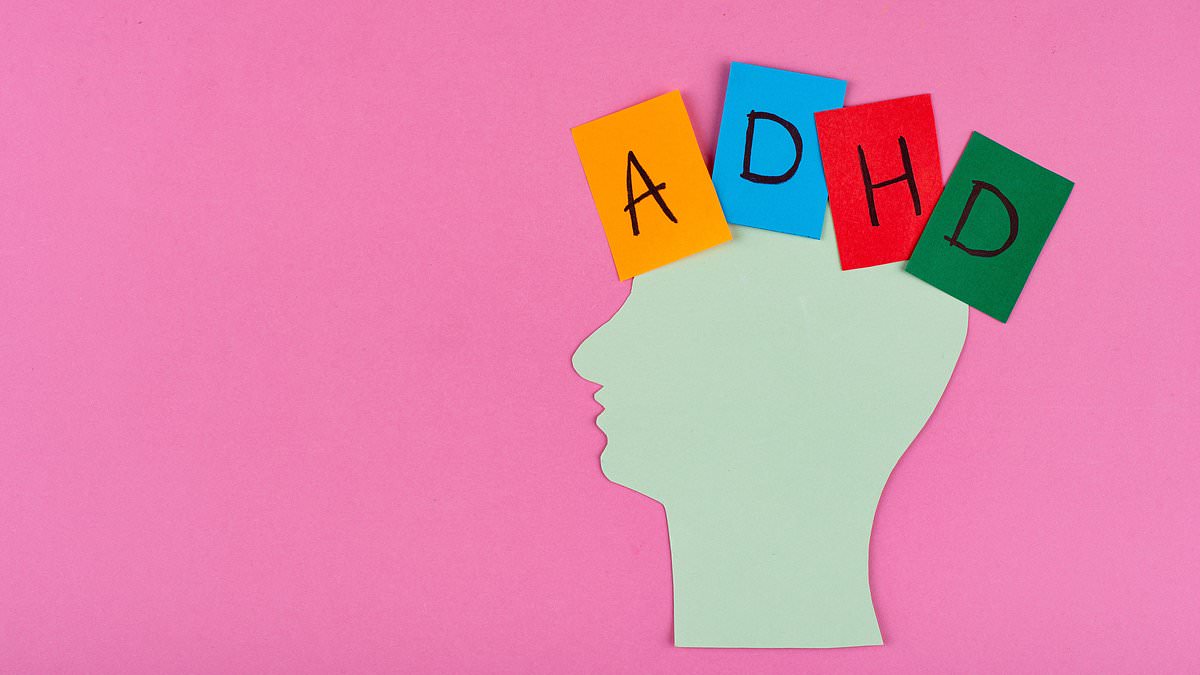Older adults with attention deficit hyperactivity disorder (ADHD) are ‘slipping through the cracks of the healthcare system’ – leaving many isolated, depressed or even misdiagnosed with dementia, experts have warned.
The condition, which causes problems with concentration, constant fidgeting and impulsive behaviour among many symptoms, is mainly associated with disruptive children.
But in what’s been described as ‘a health emergency’ by one specialist, doctors speaking to The Mail on Sunday say they fear that key signs of ADHD in older people are being missed.
There has been a surge in adults being diagnosed, with a 50-fold increase in men aged 18 to 29 being treated for ADHD.
Celebrities, such as ITV presenters Ant McPartlin, 48, and Adrian Chiles, 57, comedian Sue Perkins, 54, and singer Lily Allen, 39, have also gone public with their struggles with the condition, raising awareness.

Retired civil servant Nick Tooley, 66, said his ADHD diagnosis during the Covid-19 pandemic ‘answered so many questions’
Signs of the disorder in later life, such as constantly losing things, forgetting to pay bills on time or ‘zoning out’ during conversations, may be put down to ‘old age’.
However, experts believe ADHD is a lifelong condition – and often runs in families.
The death of, or separation from, a partner may uncover symptoms in older people says ADHD expert and clinical psychologist Dr Kathleen Nadeau.
‘Older adults we see with ADHD are more likely to be divorced or widowed and are often living in utter chaos,’ she says.
‘Suddenly they’re having to manage life all by themselves – all that structure of family and work life or spousal support is gone. The ADHD, undiagnosed for decades, can worsen, making people much more prone to social isolation and unhealthy lifestyles.’
NHS backlogs can mean long waits for assessment, with children being prioritised. A Freedom of Information request made by ADHD UK revealed a ten-year wait to see an NHS specialist in adult ADHD in some areas.
Those going undiagnosed are being denied medical treatment and support, Dr Nadeau adds.
Mail on Sunday columnist and GP Dr Ellie Cannon, wrote about a colleague in her 60s who received a shock ADHD diagnosis recently.
Dr Cannon asked if any readers had also received one – and was flooded with emails and letters.
Retired civil servant Nick Tooley, 66, said his ADHD diagnosis during the Covid-19 pandemic ‘answered so many questions’.
‘I always thought I was just a lazy person. But it explained an awful lot – why I struggled with school exams, and work seemed harder than it should be,’ he explained.
Tasks like paying bills or booking a work trip felt like huge undertakings for the father-of-two.
‘Getting the diagnosis was amazing. But it made me think that if I’d known and done something about it in the past, then life could have been so much easier,’ he said.

Podiatrist Helen Swindley, 66, was diagnosed with ADHD after her daughters left home.
Podiatrist Helen Swindley, 66, was diagnosed with the condition after her daughters left home.
‘As a mother, you do everything you have to do. But some days when they were both at school and I had a day to myself, I’d just go home and get back into bed,’ she said. ‘I needed that time for myself, but then I would label it as being lazy. Now I understand why I felt so overwhelmed.’
For Valerie Anckorn, 85, it was just learning about ADHD and recognising the traits in herself – even without a diagnosis – that gave her peace of mind.
‘I never thought I had a problem, but I saw something on Facebook and thought it looked familiar, and then I thought, ‘Blimey – that’s me, that’s what I’m like!’ It suddenly made sense of so many memories I have of being a little girl during the war. At school I just couldn’t listen to people so I would drift off, and that’s what my life’s been like – drifting in and out of things.’
Research has shown 80 per cent of those with ADHD will have at least one other psychiatric disorder in their lifetime – commonly depression or anxiety.
A pivotal 2018 study by ADHD expert Dr Russell Barkley revealed a shocking new finding: the condition can reduce life expectancy by up to 13 years.
Following a large group of ADHD patients in Milwaukee, Wisconsin, from childhood through adulthood, US researchers found that behaviours linked to the condition such as disorganisation, impulsiveness and risk-taking led to a shorter lifespan.
By treating the condition, Dr Barkley says, ADHD patients can live healthier, happier lives.
People diagnosed with ADHD are most commonly prescribed stimulants such as amphetamine-dextroamphetamine and methylphenidate – sold under brand names Adderall and Ritalin – which work by increasing activity in areas of the brain that control attention and behaviour.
ADHD can also be treated with non-stimulant medications that don’t tend to cause agitation or sleeplessness but can be less effective at improving concentration.
Psychologists often recommend psychotherapy and support groups for older adults who may lack support and community ties.
These are most effective in tandem, explains consultant psychiatrist and Royal College of Psychiatrists Fellow Professor Marios Adamou. ‘There are two things you can do to help someone who has just been diagnosed.
‘One is to support them emotionally, which is something that all people with ADHD could benefit from, whether it be counselling, coaching or friendship.

For Valerie Anckorn, 85, it was just learning about ADHD and recognising the traits in herself – even without a diagnosis – that gave her peace of mind
‘The other is intervention – which involves actually changing their symptoms and behaviour, primarily by prescribing stimulant medication.’
Both specialists described a reluctance among psychologists to prescribe such medication to older adults – likely caused by a lack of research into the effects of the drugs in the over-65 age group.
Stimulants can cause side-effects including a fast heart rate, high blood pressure and appetite loss.
They can also interfere with other medications and risk exacerbating existing health conditions. This can be of particular concern when treating older patients with several medical problems.
‘As these medications aren’t typically prescribed for older adults, there are no clear guidelines on the doses to offer, nor how they interact with other tablets that patients might be taking for health conditions that accompany old age,’ Professor Adamou explains.
As a result, he adds, psychologists often shy away from prescribing them for newly-diagnosed elderly patients.
But, according to Dr Nadeau, most of the fears over the dangers are unfounded.
‘Older adults respond very well to the same stimulants children are prescribed,’ she explains.
‘Yet most doctors are not trained to do it and aren’t comfortable doing it. It’s a real health emergency that such a common disorder is not being treated among older adults.’
In some cases, they are misdiagnosed – told by doctors that their life-long memory issues and distractedness could be dementia.
‘ADHD is often misdiagnosed as age-related cognitive decline in older adults because we’ve done almost no research on the age group,’ said Dr Nadeau. ‘Doctors don’t routinely screen for ADHD when older people come in complaining of memory problems.’
While researching her book Still Distracted After All These Years: Help and Support for Older Adults With ADHD, Dr Nadeau spoke to elderly people who were treated for dementia for years before getting a proper diagnosis.
Once they’d been correctly diagnosed and given the right treatment, their ‘dementia’ resolved.
The sudden surge of ADHD assessment referrals has made many doctors wary of people self-diagnosing. Psychotherapist Philippa Perry caused a furore by warning it was now ‘fashionable’ to have ADHD – and she believed the rocketing number of people seeking diagnoses was due to ‘social contagion’.
A 2023 BBC documentary also found a number of private clinics were diagnosing patients and offering medication based on unreliable online assessments.
In his NHS practice in south-west Yorkshire, Professor Adamou says only half of those who come for assessment ultimately receive an ADHD diagnosis.
‘There are essentially two groups of adults filling up the waiting lists: those who have had ADHD their whole lives and only now become aware of it; and those who identify as neurodiverse but aren’t.
‘Both parties are damaged by this. Those who don’t have ADHD are either misdiagnosed or have wasted time waiting in a queue, and those who do are being prevented from having treatment.’
But for those who do need treatment for a condition they’ve struggled with all their lives, experts say age should be no object, as many Mail on Sunday readers reiterated (see right).
For solicitor Duncan Strachan, 70, finding out he had ADHD two years ago, following his adult son’s diagnosis, was both a cause for celebration – ‘a great excuse for being untidy’, he joked – and a source of sadness.
‘It makes me think that if I’d recognised the traits in my son when he was at school I could have made his life so much easier,’ he says.
‘I thought he and I were both normal because we thought and acted the same way.
‘Now I don’t want anyone else to have to go through the difficulties we went through.’
It’s a fact…
Last year, more than 202,000 people in England were prescribed ADHD medication.
How does ADHD affect the brain?
The brains of people with ADHD look and work differently, experts say.
Research suggests that this is partially due to people with ADHD having less ‘feel-good’ chemicals in the areas of their brains that control emotional responses and judgment.
This lack of dopamine – which tells the brain when to feel pleasure, satisfaction and motivation – changes how ADHD patients experience reward and happiness.

The brains of people with ADHD look and work differently. They tend to find it much harder to focus on chores or work, can be guided by impulsivity and may have difficulty staying still
It also causes them to suffer from a lack of alertness, shortened attention span and decreased short-term memory, as well as making it more difficult to begin and sustain new tasks.
As a result, people with ADHD tend to find it much harder to focus on chores or work, can be guided by impulsivity and may have difficulty staying still.
Stimulant medications treat ADHD by increasing dopamine levels. Patients also appear to have differences in the size of certain parts of their brains. ‘Parts of their brain overfunction, and others underfunction,’ explained Professor Marios Adamou, a consultant psychiatrist at South West Yorkshire Partnership NHS Foundation Trust.
‘The regions that are vital for attention and cognitive control are often smaller in ADHD patients. We don’t know why but it contributes to symptoms of ADHD such as attention, motivation and organisation.’
Your letters: A lifetime of compulsive urges – and the relief of a diagnosis
I’m 64 and was diagnosed late last year with ADHD, and I’m now on medication.
The diagnosis was a massive relief – although tinged with sadness for the younger ‘me’ – as it has helped tremendously in explaining my wild, impulsive behaviour. I’m learning every day how to cope with it, and am still struggling at times.
Anna Wrazen, London
I was diagnosed with ADHD in January – I’m now 64.
I realised that I had symptoms of it after one of my co-workers told me he had ADHD.
Retaining information or even the most basic of instructions is impossible for me. I start jobs, leave them unfinished and start another, and then another.
ADHD has ruined my life and continues to do so.
Sharon Lerpiniere, Berkshire
I’m 79 and have always had a problem with concentration and being very impulsive.
At school I was told I was thick from the age of ten, which gave me very low self-esteem.
But when you don’t know any different, you just assume that you’re normal. Now I’ve reached an age where people just have to take me as I am – I don’t see the advantage of getting officially diagnosed.
Sue Dodd, Suffolk
I was diagnosed with ADHD at the age of 62 in November, but I’m not sure what I’m supposed to do with that.
Besides offering medication (which I understand there is a national shortage of), there is little else in terms of support.
It is a daily struggle and I am learning constantly.
But in a lot of ways the diagnosis was liberating – it’s not a magic bullet but it gives you something you can work on.
Meryl Bengtsson, Sussex
I’ve been trying to get an ADHD assessment since I was diagnosed with autism in 2021. It took a long time to admit to myself that I’ve had these issues all my life.
I come from the generation that didn’t admit these things and I never told anyone, not even my previous husband and partners, until a few years ago.
We are the forgotten generation by today’s GPs – too old to bother with – as my experiences seem to show.
Zee Fincham-Dudley, Kent
I have always struggled to absorb and retain information, which has led to a lifetime of anxiety, lack of confidence and self-respect and procrastination.
I am sure I could have achieved so much more in my life if it wasn’t for the fact that I would have been considered by many as just not being very bright.
However, I feel I have left it too late to bother to obtain a diagnosis of ADHD or any other related neurological disorders.
I do know in my heart that the best thing is to talk to my GP about my issues, but my head is stopping me! We come from a generation where we feel like we don’t want to impose on people, and that’s probably to our detriment.
Andrew Peters, Devon
I have been desperate to find out what makes me different from other people.
I find it difficult to follow causal thinking, I see issues in black and white and I make impulsive decisions.
I learned about ADHD in the 1990s from a neighbour. But when I retired nine years ago and asked my GP if I could have help in being assessed for autism or ADHD, he just dismissed me with: ‘Why do you want a label at your age?’ It felt very cruel. It’s probably too late to make any profound benefit in my life, but knowing that I am simply wired differently may be enough to find peace of mind for my remaining years.
Steven George, West Midlands
I’ve long suspected that I have the condition. I’m impulsive – although less so as I get older, as I have grown to be able to control myself in recent years – restless and easily distracted in most situations.
I’ve not been diagnosed but I’m 66 now, so I think I’ve coped rather well. While I was very bright at school I’ve always found reading very difficult – I lose concentration because my brain flies off somewhere.
Now, when I find myself getting distracted, I just tell myself to take a break.
Diane Hall, London
Last year I was listening to a radio programme, and as the caller listed her ADHD symptoms I realised she could have been talking about me – it was something of a revelation and a relief!
I am 62, but ever since I can remember I have found it hard to maintain concentration and retain information. At school my reports always included ‘easily distracted’, and exams were a nightmare as the only way I could remember anything was to learn it by heart. Maths was a total disaster, and still is!
So I spoke to my GP, and after asking me some questions he said it was likely that I did have ADHD but that it’s too difficult to get diagnosed on the NHS. I’d just like to have an explanation for how I’ve felt all my life.
Sarah Kilroy, West Sussex
I am 55 and have suffered all my life with feeling that I was a freak and didn’t fit into society.
It affects everything, from booking a holiday to paying bills and even relationships.
It wasn’t until one of my daughters was talking to me a couple of years ago about her own neural diversity that it struck a chord with me. I visited my GP, as I had been struggling with the menopause, and mentioned ADHD.
I scored very highly on the questionnaire but didn’t put myself on the NHS waiting list as I was told it would take at least 18 months to see anyone.
Now I’m inspired to seek help again and go on medication.
Katie Fields, via email









